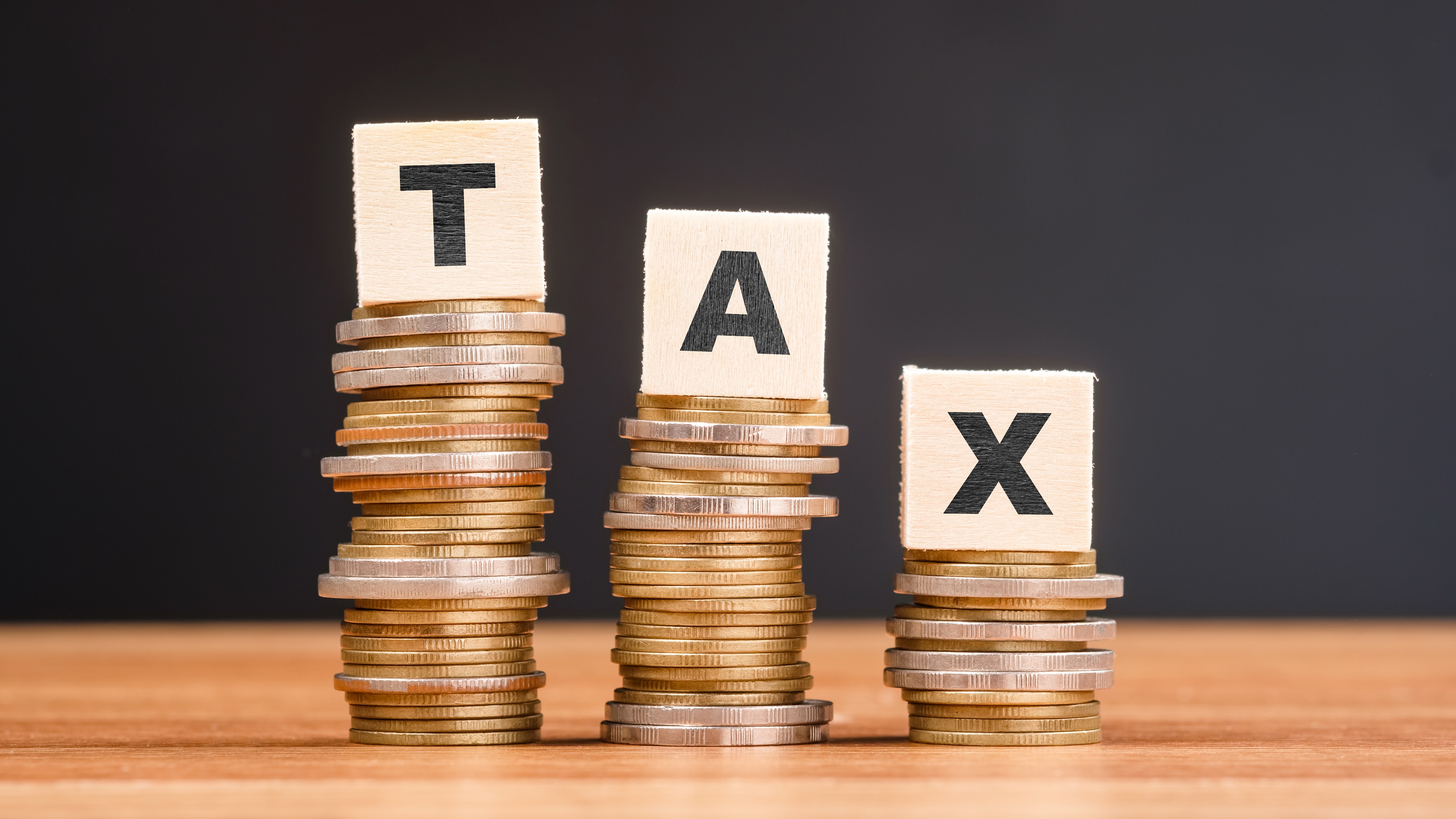3 Ways to Pay Less Taxes in 2023
Using brokerage accounts as collateral, investing in a Roth IRA and opening an HSA account are all ways to ease your tax burden and boost savings in the new year.

Profit and prosper with the best of Kiplinger's advice on investing, taxes, retirement, personal finance and much more. Delivered daily. Enter your email in the box and click Sign Me Up.
You are now subscribed
Your newsletter sign-up was successful
Want to add more newsletters?

Delivered daily
Kiplinger Today
Profit and prosper with the best of Kiplinger's advice on investing, taxes, retirement, personal finance and much more delivered daily. Smart money moves start here.

Sent five days a week
Kiplinger A Step Ahead
Get practical help to make better financial decisions in your everyday life, from spending to savings on top deals.

Delivered daily
Kiplinger Closing Bell
Get today's biggest financial and investing headlines delivered to your inbox every day the U.S. stock market is open.

Sent twice a week
Kiplinger Adviser Intel
Financial pros across the country share best practices and fresh tactics to preserve and grow your wealth.

Delivered weekly
Kiplinger Tax Tips
Trim your federal and state tax bills with practical tax-planning and tax-cutting strategies.

Sent twice a week
Kiplinger Retirement Tips
Your twice-a-week guide to planning and enjoying a financially secure and richly rewarding retirement

Sent bimonthly.
Kiplinger Adviser Angle
Insights for advisers, wealth managers and other financial professionals.

Sent twice a week
Kiplinger Investing Weekly
Your twice-a-week roundup of promising stocks, funds, companies and industries you should consider, ones you should avoid, and why.

Sent weekly for six weeks
Kiplinger Invest for Retirement
Your step-by-step six-part series on how to invest for retirement, from devising a successful strategy to exactly which investments to choose.
By reducing your tax burden, you can lower the amount of money you send to the IRS this year… and redirect those dollars to your own savings or spending goals. These three strategies are worth considering if you want to pay less taxes (legally!) in 2023.

1. Create Liquidity From Your Investments.
Individual investment accounts, or brokerage accounts, are great vehicles to use on your journey to building wealth. Unlike qualified retirement accounts, like 401(k)s or IRAs, brokerage accounts don’t come with stipulations or rules about how or when you can access your assets. In theory, that money is yours anytime for any reason (although, in practice, you probably don’t want to dip in and out of the account and therefore unnecessarily interrupt the compounding process of that money in the market).
The cost of that freedom and flexibility? Taxes. Brokerage accounts receive no special tax treatments like qualified retirement accounts. You contribute after-tax money, and if and when you need to liquidate assets from the account, any gains will be subject to short- or long-term capital gains taxes.
Unless you consider this strategy: Instead of liquidating assets in your brokerage account, which can trigger a taxable event, use your assets as collateral to get a line of credit.
Depending on the bank or custodian you use, you can use cash in a bank account or assets in a brokerage account as collateral against a line of credit. If you needed cash quickly, you could then use the line of credit rather than selling out of positions within your investment portfolio to generate that cash and potentially rack up a bigger tax bill. This also provides you with the benefit of allowing your invested assets to stay invested while you use the cash from the line of credit for other purposes.
Of course, this isn’t just free money. The line of credit will come with an interest rate, which can be variable or fixed, and you need to repay whatever you borrow against it plus that interest. This is why, when we discuss this strategy with our financial planning clients, we frame it as a “just in case” option or a safety net.
The line of credit is there if you need it… but that doesn’t necessarily mean it’s a good idea to rely on it or to plan to use it heavily. If you’re trying to pay for a known purchase or goal, it’s better to plan ahead and use other means (like saving up for it in cash over a period of time) to finance the purchase rather than increasing your costs via interest payments.
The ability to do this will depend on your financial institution, your account balances and your credit history. Not all custodians will offer this to retail investors, either; you may need to go through an institutional custodian (which might mean working with a financial adviser to do so).

2. Get Around Income Limits — or Avoid Income Taxes Entirely.
A Roth IRA is a great investment tool to use to help reduce your tax burden in the future. The money you contribute to the account can grow tax-free, and you may not have to pay taxes on your earnings. (This assumes you stick to the rules: You make your withdrawals after age 59½, and the Roth has been open for at least five years.)
Sounds great, right? Here’s the catch: You might make too much money to contribute to the Roth. At least, you might make too much to contribute directly.
This is where backdoor Roth conversions come in. This strategy lets you contribute money to an IRA and then roll that retirement money from the IRA’s pre-tax bucket to the Roth’s after-tax bucket. This can dramatically reduce your tax burden in retirement when it’s time to use the money that you’ve saved.
While getting around the income limits for contributing to a Roth IRA is possible, you still have an income that you have to report … unless you live in a state with no income taxes.
While uprooting to a no-income-tax state might be a stretch for some people, the fact that you can skip out on state income taxes is a real consideration if you’re already contemplating a move. It’s not a reason to move on its own, but it could tip the scales in favor of one state over another.
And here’s a bonus tax-saving tip: If you plan to buy a home, make sure you live in your new residence for two of the last five years to benefit from the capital gain tax exemption.

3. Grow Tax-Free Wealth With an HSA.
There’s no such thing as a free lunch… with possibly one exception when it comes to tax-free money. Health savings accounts, or HSAs, are the only kind of investment account that provide a triple-tax advantage:
- Your contributions to the account could be tax-deductible and are tax-free.
- Any growth within the account is tax-free.
- Withdrawals on qualified medical expenses are tax-free.
While some people use their HSA on an ongoing basis, that likely only allows you to take advantage of the first and third tax advantages. If you contribute cash and then use that cash for qualified medical expenses, you don’t give your money a chance to grow.
If you want to leverage an HSA to its fullest potential, you need to make sure your contributions are invested — and, ideally, they stay invested for as long as possible. What we often recommend to clients with HSAs is to:
- Make the maximum contribution to the HSA each year.
- Invest the contributions and leave them invested.
- Pay for medical costs out of pocket during your working and earning years
- Enjoy what amounts to a “medical IRA” in retirement, when your health care costs are likely going to be much higher than they are today (and remember that you can use HSA money to pay for Medicare Parts B, C and D premiums as well as LTC insurance and normal qualified medical expenses).
Like everything else, this strategy doesn’t work for everyone. It’s worth considering if you are young, healthy and do not usually incur lots of medical costs. But if you use medical services frequently or have a lot of high-cost prescriptions, for example, this might not be the best option.
For one, it could be financially better to actually use your HSA to help manage those costs year-to-year. Two, it might also mean you shouldn’t have an HSA to begin with, because you can only use an HSA if you have a high-deductible health plan (or HDHP). That might not make sense if you’re going to the doctor frequently or often incur lots of medical bills each year.
As with most things in financial planning, the ultimate answer on “does this strategy work for me?” will always be “it depends.” But it’s worth exploring your options to see how you can maximize your wealth — while minimizing how much of it has to go to the IRS.
--
This article was written by and presents the views of our contributing adviser, not the Kiplinger editorial staff. You can check adviser records with the SEC or with FINRA.
Profit and prosper with the best of Kiplinger's advice on investing, taxes, retirement, personal finance and much more. Delivered daily. Enter your email in the box and click Sign Me Up.

Eric Roberge, CFP®, is the founder of Beyond Your Hammock, a financial planning firm working in Boston, Massachusetts and virtually across the country. BYH specializes in helping professionals in their 30s and 40s use their money as a tool to enjoy life today while planning responsibly for tomorrow.
Eric has been named one of Investopedia's Top 100 most influential financial advisers since 2017 and is a member of Investment News' 40 Under 40 class of 2016 and Think Advisor's Luminaries class of 2021.
-
 Quiz: Do You Know How to Avoid the "Medigap Trap?"
Quiz: Do You Know How to Avoid the "Medigap Trap?"Quiz Test your basic knowledge of the "Medigap Trap" in our quick quiz.
-
 5 Top Tax-Efficient Mutual Funds for Smarter Investing
5 Top Tax-Efficient Mutual Funds for Smarter InvestingMutual funds are many things, but "tax-friendly" usually isn't one of them. These are the exceptions.
-
 AI Sparks Existential Crisis for Software Stocks
AI Sparks Existential Crisis for Software StocksThe Kiplinger Letter Fears that SaaS subscription software could be rendered obsolete by artificial intelligence make investors jittery.
-
 Social Security Break-Even Math Is Helpful, But Don't Let It Dictate When You'll File
Social Security Break-Even Math Is Helpful, But Don't Let It Dictate When You'll FileYour Social Security break-even age tells you how long you'd need to live for delaying to pay off, but shouldn't be the sole basis for deciding when to claim.
-
 I'm an Opportunity Zone Pro: This Is How to Deliver Roth-Like Tax-Free Growth (Without Contribution Limits)
I'm an Opportunity Zone Pro: This Is How to Deliver Roth-Like Tax-Free Growth (Without Contribution Limits)Investors who combine Roth IRAs, the gold standard of tax-free savings, with qualified opportunity funds could enjoy decades of tax-free growth.
-
 One of the Most Powerful Wealth-Building Moves a Woman Can Make: A Midcareer Pivot
One of the Most Powerful Wealth-Building Moves a Woman Can Make: A Midcareer PivotIf it feels like you can't sustain what you're doing for the next 20 years, it's time for an honest look at what's draining you and what energizes you.
-
 I'm a Wealth Adviser Obsessed With Mahjong: Here Are 8 Ways It Can Teach Us How to Manage Our Money
I'm a Wealth Adviser Obsessed With Mahjong: Here Are 8 Ways It Can Teach Us How to Manage Our MoneyThis increasingly popular Chinese game can teach us not only how to help manage our money but also how important it is to connect with other people.
-
 Looking for a Financial Book That Won't Put Your Young Adult to Sleep? This One Makes 'Cents'
Looking for a Financial Book That Won't Put Your Young Adult to Sleep? This One Makes 'Cents'"Wealth Your Way" by Cosmo DeStefano offers a highly accessible guide for young adults and their parents on building wealth through simple, consistent habits.
-
 Global Uncertainty Has Investors Running Scared: This Is How Advisers Can Reassure Them
Global Uncertainty Has Investors Running Scared: This Is How Advisers Can Reassure ThemHow can advisers reassure clients nervous about their plans in an increasingly complex and rapidly changing world? This conversational framework provides the key.
-
 I'm a Real Estate Investing Pro: This Is How to Use 1031 Exchanges to Scale Up Your Real Estate Empire
I'm a Real Estate Investing Pro: This Is How to Use 1031 Exchanges to Scale Up Your Real Estate EmpireSmall rental properties can be excellent investments, but you can use 1031 exchanges to transition to commercial real estate for bigger wealth-building.
-
 Should You Jump on the Roth Conversion Bandwagon? A Financial Adviser Weighs In
Should You Jump on the Roth Conversion Bandwagon? A Financial Adviser Weighs InRoth conversions are all the rage, but what works well for one household can cause financial strain for another. This is what you should consider before moving ahead.

